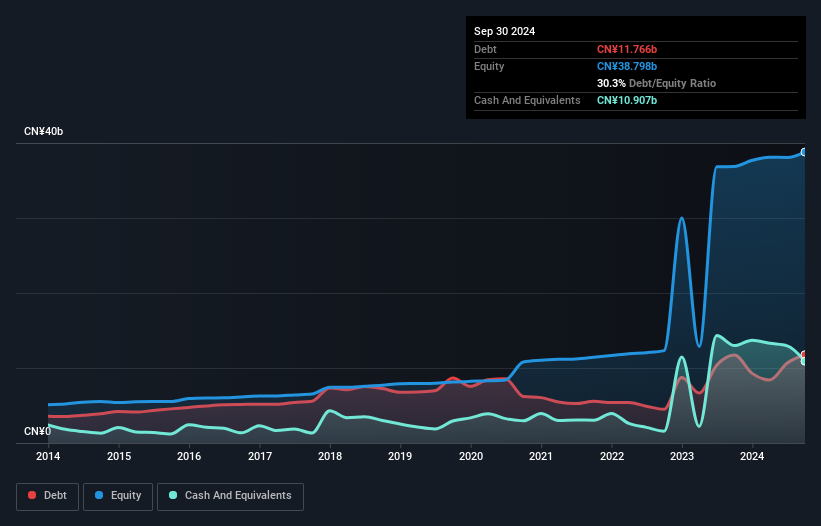- China
- /
- Aerospace & Defense
- /
- SHSE:600372
We Think AVIC Airborne Systems (SHSE:600372) Is Taking Some Risk With Its Debt
Warren Buffett famously said, 'Volatility is far from synonymous with risk.' When we think about how risky a company is, we always like to look at its use of debt, since debt overload can lead to ruin. Importantly, AVIC Airborne Systems Co., Ltd. (SHSE:600372) does carry debt. But the more important question is: how much risk is that debt creating?
What Risk Does Debt Bring?
Generally speaking, debt only becomes a real problem when a company can't easily pay it off, either by raising capital or with its own cash flow. In the worst case scenario, a company can go bankrupt if it cannot pay its creditors. While that is not too common, we often do see indebted companies permanently diluting shareholders because lenders force them to raise capital at a distressed price. Of course, plenty of companies use debt to fund growth, without any negative consequences. When we think about a company's use of debt, we first look at cash and debt together.
View our latest analysis for AVIC Airborne Systems
What Is AVIC Airborne Systems's Debt?
As you can see below, AVIC Airborne Systems had CN¥11.8b of debt, at September 2024, which is about the same as the year before. You can click the chart for greater detail. However, it also had CN¥10.9b in cash, and so its net debt is CN¥859.7m.

How Strong Is AVIC Airborne Systems' Balance Sheet?
The latest balance sheet data shows that AVIC Airborne Systems had liabilities of CN¥32.7b due within a year, and liabilities of CN¥3.12b falling due after that. On the other hand, it had cash of CN¥10.9b and CN¥29.2b worth of receivables due within a year. So it actually has CN¥4.30b more liquid assets than total liabilities.
This surplus suggests that AVIC Airborne Systems has a conservative balance sheet, and could probably eliminate its debt without much difficulty. Carrying virtually no net debt, AVIC Airborne Systems has a very light debt load indeed.
In order to size up a company's debt relative to its earnings, we calculate its net debt divided by its earnings before interest, tax, depreciation, and amortization (EBITDA) and its earnings before interest and tax (EBIT) divided by its interest expense (its interest cover). This way, we consider both the absolute quantum of the debt, as well as the interest rates paid on it.
AVIC Airborne Systems has a low debt to EBITDA ratio of only 0.30. But the really cool thing is that it actually managed to receive more interest than it paid, over the last year. So it's fair to say it can handle debt like a hotshot teppanyaki chef handles cooking. The modesty of its debt load may become crucial for AVIC Airborne Systems if management cannot prevent a repeat of the 25% cut to EBIT over the last year. When a company sees its earnings tank, it can sometimes find its relationships with its lenders turn sour. There's no doubt that we learn most about debt from the balance sheet. But ultimately the future profitability of the business will decide if AVIC Airborne Systems can strengthen its balance sheet over time. So if you're focused on the future you can check out this free report showing analyst profit forecasts.
Finally, while the tax-man may adore accounting profits, lenders only accept cold hard cash. So we clearly need to look at whether that EBIT is leading to corresponding free cash flow. Over the last three years, AVIC Airborne Systems saw substantial negative free cash flow, in total. While investors are no doubt expecting a reversal of that situation in due course, it clearly does mean its use of debt is more risky.
Our View
While AVIC Airborne Systems's EBIT growth rate has us nervous. To wit both its interest cover and net debt to EBITDA were encouraging signs. Looking at all the angles mentioned above, it does seem to us that AVIC Airborne Systems is a somewhat risky investment as a result of its debt. That's not necessarily a bad thing, since leverage can boost returns on equity, but it is something to be aware of. Over time, share prices tend to follow earnings per share, so if you're interested in AVIC Airborne Systems, you may well want to click here to check an interactive graph of its earnings per share history.
Of course, if you're the type of investor who prefers buying stocks without the burden of debt, then don't hesitate to discover our exclusive list of net cash growth stocks, today.
New: Manage All Your Stock Portfolios in One Place
We've created the ultimate portfolio companion for stock investors, and it's free.
• Connect an unlimited number of Portfolios and see your total in one currency
• Be alerted to new Warning Signs or Risks via email or mobile
• Track the Fair Value of your stocks
Have feedback on this article? Concerned about the content? Get in touch with us directly. Alternatively, email editorial-team (at) simplywallst.com.
This article by Simply Wall St is general in nature. We provide commentary based on historical data and analyst forecasts only using an unbiased methodology and our articles are not intended to be financial advice. It does not constitute a recommendation to buy or sell any stock, and does not take account of your objectives, or your financial situation. We aim to bring you long-term focused analysis driven by fundamental data. Note that our analysis may not factor in the latest price-sensitive company announcements or qualitative material. Simply Wall St has no position in any stocks mentioned.
About SHSE:600372
AVIC Airborne Systems
Provides aviation airborne system products in China.
Excellent balance sheet second-rate dividend payer.
Market Insights
Community Narratives



